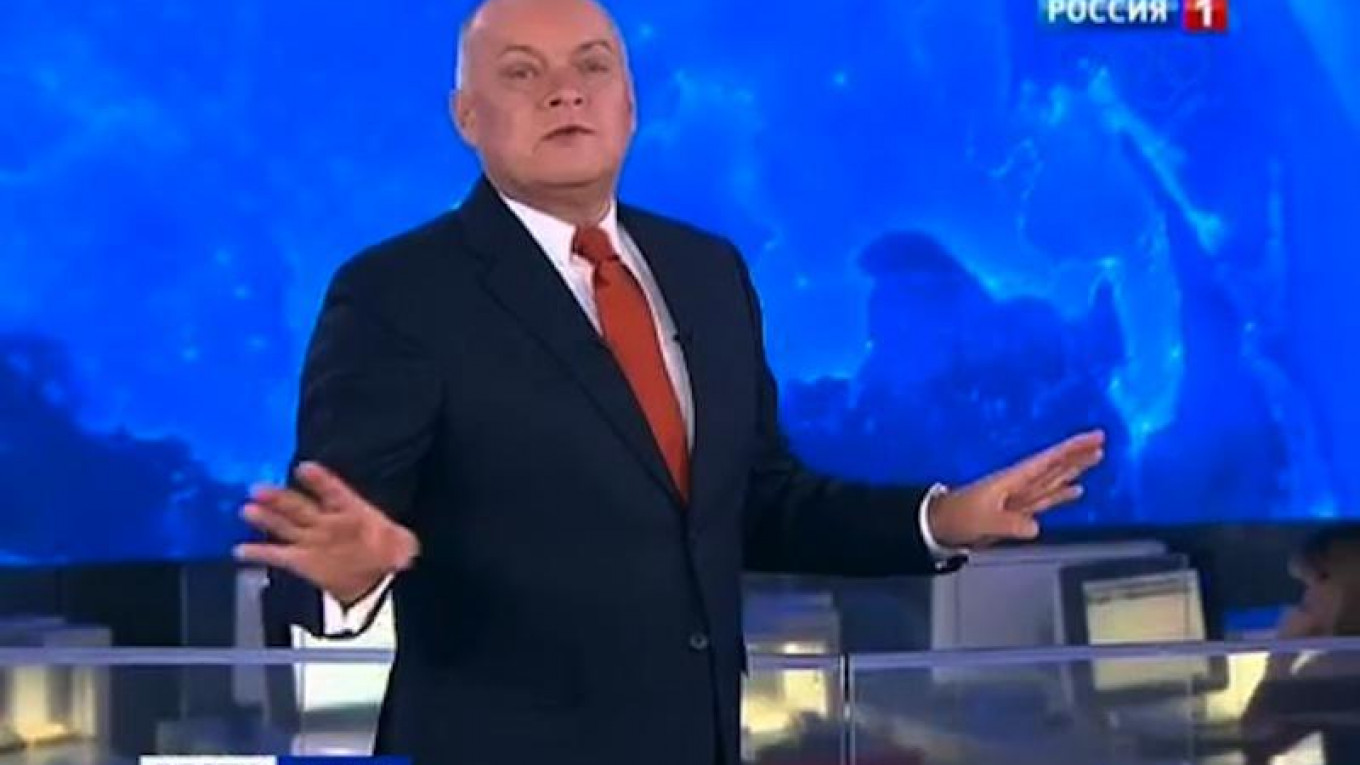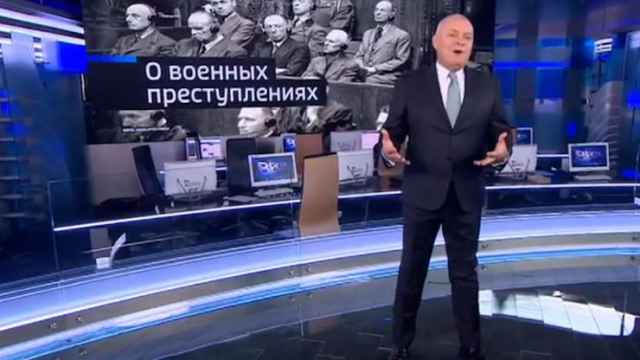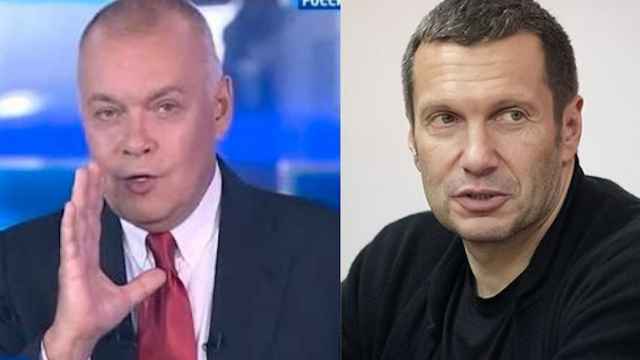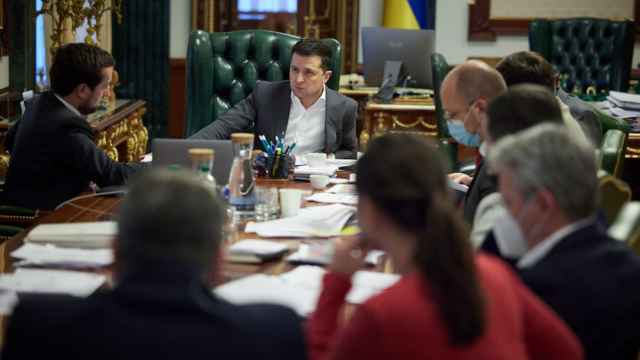We continue with our weekly analysis of the main talking points of Russian TV’s Sunday news review programs. The three flagship shows — Voskresnoye Vremya [The Times on Sunday], Vesti Nedeli [Weekly News] and Sunday Evening With Vladimir Solovyev — are together watched by tens of millions every week. This week’s coverage of international affairs focused on the upcoming U.S. presidential elections and allegations that they will be rigged in favor of one of the candidates.
Election fraud was a hot issue on Russia’s Sunday evening news programs. No, not fraud in September’s Duma elections or the upcoming Russian presidential elections, but rather in November’s U.S. presidential elections.
On Rossiya 24’s "Weekly News," presenter Dmitry Kiselyov accused the American press of corrupting the presidential election by accepting favors from the Clinton campaign’s staff. Kiselyov introduced the story by telling viewers that, in the final lap of the electoral race, one candidate had alleged that the election results may be falsified and suggested he might not recognize them. Kiselyov was referring to Donald Trump’s comments at Tuesday’s presidential debate, the last debate before the November election.
Kiselyov then played a clip from the debate showing Trump lashing out at the “dishonest media” without Russian dubbing or subtitles, leaving a large portion of Kiselyov’s audience clueless as to what the candidate had said.
Based on these comments, Kiselyov claimed that U.S. elections could be judged by the same formula that the U.S. has judged other nations’ elections — not transparent, lacking competition, mass falsification, and carried out using the resources of the incumbent administration.
“They can’t be called free and democratic,” Kiselyov told his viewers.
Kiselyov explained that Trump’s concerns were related to states which have early voting and lack voter I.D. laws. The audience was then shown a clip of Trump claiming that about 1.8 million dead people are allegedly still on voter rolls. Kiselyov then mentioned that the U.S. refused to allow international election observers, “specifically from Russia.”
What he failed to point out is that the U.S. is allowing election observers from the Organization for Security and Cooperation in Europe (OSCE), and the U.S. State Department invited Russian observers to join the OSCE election monitoring mission. The invitation was declined by Russia, however, which wanted to monitor the elections with their own mission.
The same theme of electoral fraud flowed through Channel One’s “The Times on Sunday” news program with its famous classic Soviet-era intro music.
The story began with a title taken from the lyrics of a famous Russian pop song: “The carousel beckons, beckons, beckons.” Of course, “carousel” is a reference to a common election rigging tactic in which paid voters cast their ballot more than once at different poling places. In case the viewer wasn’t clear on who plans to rig the election, there was a photo of Hillary Clinton on the screen.
The story began not in Washington D.C. or at the last presidential debate, but in the chicken yard of a farm far from the capital. The narrator explained how America’s traditional election day — the first Tuesday in November — was chosen to fit the needs of farmers. Coincidentally, the farmer interviewed by Channel One’s correspondent happened to be a Trump supporter.
After this, "The Times of Sunday" gave a textbook explanation of the most unique feature of U.S. presidential elections: the electoral college. The reporter then informed viewers about occasions when U.S. presidents won the election without winning the popular vote, most recently George W. Bush's victory in 2000. The same concerns have been voiced by many Americans. Thus far, however, there has not been any evidence that carousel voting could be employed in the American electoral system -- well, if you exclude the claims of former New York mayor Rudy Giuliani.
"The Times" jumped to a CNN clip in which Giuliani, a former GOP presidential primary candidate and a Trump backer, made allegations of vote rigging in several key U.S. states. Giuliani claimed that some voters cast ballots eight to nine times. Rather than challenge Giuliani’s assertion as some other news outlets have, the reporter went on to tell viewers that “this is happening in a country that gives out its evaluation of the democracy of others’ elections all over the world.”
Next came a long lecture about corporate money and lobbying in U.S. politics. The broadcast recycled a Trump campaign talking point: the idea that a candidate with such massive personal wealth would not be beholden to monied interests if elected.
The highlight of this segment was the narrator's praise for Louis Thomas McFadden, a Republican congressman from the 1930s who, viewers were told, fought against the Federal Reserve system because it was “set up by international bankers.” The segment failed to mention that McFadden was far more direct in his criticism of the Fed and claimed that it was a plot by Jewish bankers to overthrow the government. McFadden also expressed admiration for Adolf Hitler on numerous occasions and was also praised in the Nazi German publication "Die Stürmer." The narrator claimed that McFadden survived two assassination attempts before succumbing to the third one; in reality, McFadden died of natural causes.
When it comes to coverage of the U.S. election, it seems Rossiya 24 came in with guns blazing, whereas First Channel made a decent, almost rational start before putting on the tin-foil hat.
A Message from The Moscow Times:
Dear readers,
We are facing unprecedented challenges. Russia's Prosecutor General's Office has designated The Moscow Times as an "undesirable" organization, criminalizing our work and putting our staff at risk of prosecution. This follows our earlier unjust labeling as a "foreign agent."
These actions are direct attempts to silence independent journalism in Russia. The authorities claim our work "discredits the decisions of the Russian leadership." We see things differently: we strive to provide accurate, unbiased reporting on Russia.
We, the journalists of The Moscow Times, refuse to be silenced. But to continue our work, we need your help.
Your support, no matter how small, makes a world of difference. If you can, please support us monthly starting from just $2. It's quick to set up, and every contribution makes a significant impact.
By supporting The Moscow Times, you're defending open, independent journalism in the face of repression. Thank you for standing with us.
Remind me later.






